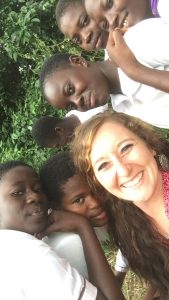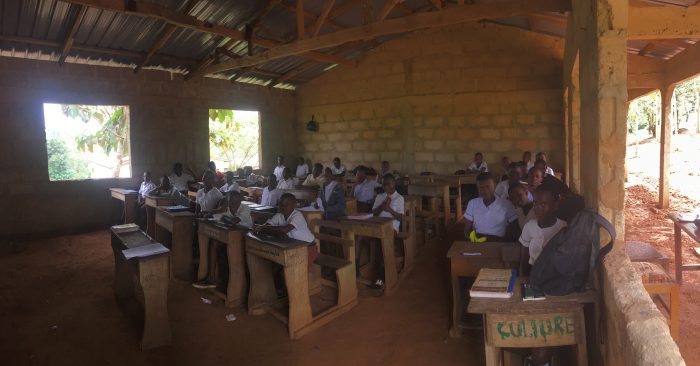I sat on the porch over-looking the school yard. The primary students were all outside shrieking and laughing, enjoying their morning break. The air was cool, yet heavy; clouds moving lazily overhead, barely able to hold the weight of the moisture that they were carrying. I breathed in deep and long, enjoying the mountain air that I have already come to call home. I was brought back to reality from my thoughts as the Form 2 students, whose classroom was behind me, began to grow louder with each voice trying to compete over the next. The wooden chair creaked under me as I turn around to see what all the commotion was about. The students, not busy, were left to their own demise and action plans, and for a group that is between the ages of 11 and 16, that could be anything. From behind me, I heard a teacher say, “you can go in and teach, if you want.”
I fumbled for my white board markers, and tried to calm my breathing. For goodness sakes, I am a qualified teacher, after 6 years and two degrees, you would assume that the nerves would cease. They do not, and as I pulled myself together, I entered the classroom. The students began to quiet down for me and I simply asked, “What do you want to learn?” “Science!” the classroom erupted in unison. I grabbed my Integrated Science textbook, asked what unit and lesson that the class was on, and as I found the page the first three definitions stopped me in my tracks. Chemistry. The subject I dreaded learning in school, now became the subject I would be teaching for the day. I started with basic definitions, and after the nerves cleared, I fell into my normal teaching mannerisms, and began to gain the confidence that I knew I possessed. After I taught the lesson, I asked for three volunteers, and hands went up quickly! I chose my three volunteers and gave them the simple task of teaching the class the definitions. Laughter erupted as looks of shock and possibly a little terror claimed my three volunteers. I gave reassurance, telling them that I knew that they could teach just as well as I could! One by one, they conquered the fear of speaking and after some fumbles, aid from their peers, and nervous giggles, all three succeeded in teaching the definitions. They all received high-fives from me and before I let them sit back down, I asked the class if we could give them a special clap. “Yes!” was the unanimous answer. The special clap was taught, and once again, laughter erupted in the class. I couldn’t help but laugh, too. Seeing pure joy on the faces of these students kept my confidence alive. I began to finish up the lesson and I was proud that I not only got through the material, but the students had a blast!
As I was prepping to give the students an exercise assignment and leave the classroom, I was asked if I would stay for a thousand years. I replied, with a laugh and a smile on my face, “I will be an old woman then!” And they all said, “that’s okay madam! We will still want you here!” I laughed and thanked them for their kindness and went back to my wooden chair.
After realizing what I had been asked, I was brought down to a level of humility that I had not  experienced initially. The students wanted me here. They wanted me to stay and be a part of their lives and their future. I had stepped into the classroom to show that I could teach, and in reality, it wasn’t my teaching at all. It wasn’t about exhibiting the perfect teaching pedagogy, or trying to establish the next Einstein in one class day. It was about the little moments. The moments that could change a students’ life and give them confidence in their learning with simple encouragements, like a high-five and a fancy clap. The moments when you hear them say “Madam, madam, we want you to keep teaching us.”
experienced initially. The students wanted me here. They wanted me to stay and be a part of their lives and their future. I had stepped into the classroom to show that I could teach, and in reality, it wasn’t my teaching at all. It wasn’t about exhibiting the perfect teaching pedagogy, or trying to establish the next Einstein in one class day. It was about the little moments. The moments that could change a students’ life and give them confidence in their learning with simple encouragements, like a high-five and a fancy clap. The moments when you hear them say “Madam, madam, we want you to keep teaching us.”
Often, the little moments in life are overlooked by the hustle and bustle of routine. The focus on finding perfection, getting through a task, or even mastering a topic can become such a sole focus that you forget the point of what life is all about. Relationships. Finding areas where you can inspire others, change their mindsets, letting them think outside the box. Finding comfort in the uncomfortable, like teaching a subject that isn’t your strong suit and then watching others succeed. It is all about a process; a journey.
I became a part of this journey in March, but I was not prepared for the impact, even so soon, that it would have. My emotions resemble that of a roller coaster, daily, and some moments are major highs of laughter, joy, and success’. Other moments are lows of questioning my abilities, the missing of home, and the doubts. The little moments of highs change my entire perspective of my lows. Without the low points in a journey, the highs would not be near as life changing as they should be. I know that embracing all the emotions help to build those relationships; the relationships in the classroom, the walk through my community, and in my host family. The little moments make every day, hour, minute and second worth it. It is the little moments in life that, although are small, become the biggest influence.
I do not know what the year will hold, but I do know that if I could have a thousand years to spend with these students, then I would spend each one cherishing all those little moments that make life truly meaningful.
Hope Sorrells received a bachelors in Agricultural Education and a masters in Agriculture from West Texas A&M University. Before becoming an AgriCorps Fellow Hope traveled to Honduras to study agriculture.


